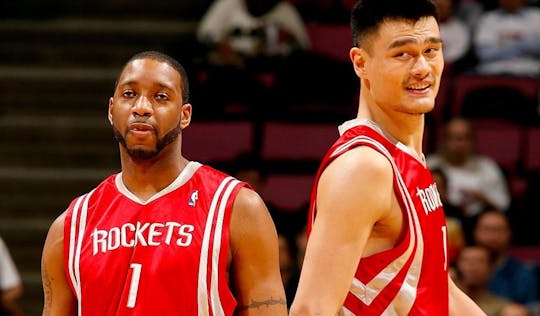“Don’t ever underestimate the heart of a champion!”
That was the famous statement made by Coach Rudy Tomjanovich after the Houston Rockets won the 1995 NBA Championship. That year’s team was a heavy underdog, having won only 47 games and finishing sixth in the West. But behind the brilliance of Hakeem Olajuwon and his college teammate Clyde Drexler, they tore through four 50-win teams to bring the trophy back to Houston.
The Rockets were hoping to rekindle that same magic when they paired another international star in Yao Ming and an athletic scorer in Tracy McGrady back in 2004.
State of the NBA
The early 2000s were ruled by one team: the LA Lakers. How could they not? In most games, they had the two best players on the court. Other teams could stack All-Stars against Shaquille O’Neal and Kobe Bryant, but when those two decided to turn it on, they showed that All-NBA trumps All-Star any day.
In 2004, the cracks started to show in the Shaq-Kobe relationship. The two constantly took shots at each other in interviews, with Bryant disappointed in O’Neal’s work ethic and O’Neal upset about Bryant’s ball-hogging play. There were even reports of a fight breaking out between the two stars. The end of the line was when the two couldn’t lead the 2004 Lakers superteam against the superstar-less Detroit Pistons.
The break-up of Shaq and Kobe left the top of the Western Conference wide open. The Rockets looked to fill that massive hole by forming an All-Star duo of their own.
The lineup
There weren’t many players that could stop Shaq in the early 2000s. He was like a Mack Truck barging into the paint. If anyone stood in his way, he would easily go through them.
There was one player that could slow Diesel down significantly: Yao.
Standing at 7’6” and weighing in at 310 pounds, Yao was a huge roadblock that O’Neal had to go through to get to the hoop. Against Yao back in 2004, O’Neal averaged 23 points on 50.8 percent shooting. While he still got his points, Shaq had to work for it against Yao. He was far from his 2004 average of 58.4 percent from the field. In fact, Yao held him to less than 42 percent shooting in three of their four matchups that season.
Yao was no slouch that year. In his second year in the league, he significantly improved his numbers, notching averages of 17.5 points, 9.0 rebounds, 1.9 blocks, and 52.2 percent shooting from the field. Yao was also voted as an All-Star starter in 2004, his second consecutive start after ending O’Neal’s run of four straight starts the year before.
With literally the biggest piece of the puzzle in place, what the Rockets needed was a complementary addition to the team. That’s why they traded for Tracy McGrady in the 2004 offseason.
As good as Yao was, he didn’t pack a major scoring punch. That’s why McGrady was seen as a great partner to the All-Star big man. T-Mac didn’t shy away from taking the shot. In his final two years in Orlando, he averaged 30 points per game and led the league in scoring in back-to-back seasons.
On the surface, it seemed like McGrady was being brought to be the team’s counterpart to Bryant. But in reality, he was coming in as the first scoring option of the Rockets. If he was able to lead the league in scoring when the entire defense was focused on him during his time with the Magic, imagine the damage he could do with Yao occupying a huge chunk of the court.
The Rockets followed the blueprint of the Lakers. They paired up a generational big man with an undeniable scoring force, hoping to reach the same level of success as their inter-conference rivals.
The aftermath
Even with the implosion, there was no denying the chemistry that Shaq and Kobe had together. That strong relationship on the court was built through constant repetition, built through consistently playing together. O’Neal and Bryant played 461 games across eight seasons together.
That’s something Yao and T-Mac never got to develop. In the five years that they played together from 2004 to 2009, they played only 220 games with each other. The two just couldn’t stay on the court together, missing a combined 179 games during that span.
Because of that, the Rockets with these two leading the way were largely an inconsistent team. The raw number of wins looks impressive as the team won more than 50 games in four of the five seasons Yao and McGrady were on the team. But in a stacked Southwest Division with perennial contenders like the San Antonio Spurs and Dallas Mavericks, they just couldn’t break through. They were eliminated in the first round four times from 2004 to 2008.
The peak of this team was in ‘07-’08 when they won 22 straight games. They finished with 55 wins that season, the highest single-season total of the Yao and T-Mac Rockets. That still wasn’t enough to get them to the top of the conference. They finished 5th in the West that season and were edged out of home court advantage by a 54-win Utah Jazz team who ended up winning the Pacific.
That’s the story of this version of the Rockets. They were good. McGrady was good. Yao was good. They were good for only 220 games together. They were good for 22 straight wins. They were good for a first-round playoff appearance. But they just weren’t great. To win a championship like Shaq and Kobe or Hakeem and Clyde, you have to be great.




